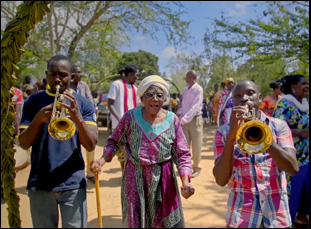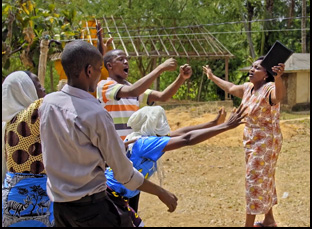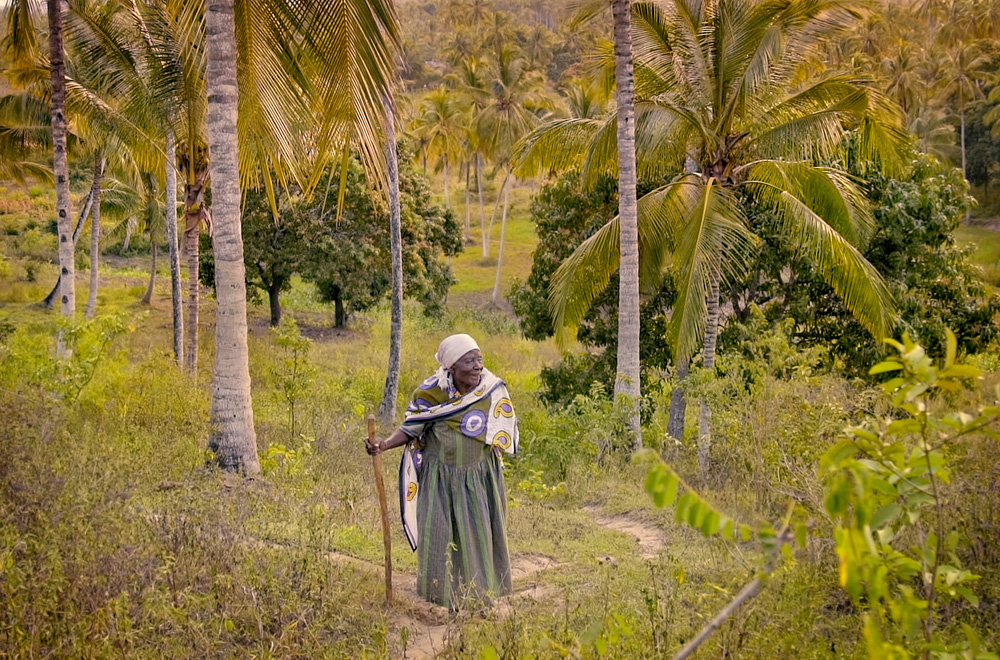Maia Lekow wasn’t entirely sure she wanted to write any music for “The Letter.” After filming in her native Kenya for the better part of a decade with her husband Christopher King, it was only natural to expect the musician/filmmaker to want to contribute to the film’s soundtrack, but knowing what a delicate story the two had on their hands, her instincts as an artist were holding her back.
“I just didn’t feel comfortable with trying to take away from the film in a sense from a musical perspective,” recalls Lekow. “It really took me a long time and Ricardo [Acosta], our editor, and Chris to persuade me to just write something or just try and write.”
Patience had been a virtue throughout “The Letter,” which follows a young man named Karisa Karango back to the village where his grandmother Margaret lives after alarming reports that she’s been accused of witchcraft, and Lekow waited for inspiration, eventually arriving in the form of a nursery rhyme that led to start working on “Miembe,” which translated to English means “Under the Mango Tree” and you can see performed below with her band Maia & the Big Sky:
“Just for me to be able to sing it in a higher tone, much slower and then just try and reverse some of my vocals on the keyboard to just be able to create that bed…,” Lekow recalls of getting her creative juices flowing on the track, which she worked on with co-composer Ken Myhr. “I played it to Ricardo and Chris and they were like, ‘There’s definitely something here, let’s do this more.’”
Eventually, there was an entire soundtrack and the process of creating the music turned out to be not all that different from making the film, requiring a remarkable amount of complexity to yield as simple and emotionally direct experience as possible. Recently selected as Kenya’s official submission for the Academy Awards, “The Letter” may be set in a small family compound in Mombosa, but it speaks to far-ranging issues both nationally and internationally as you get to know Margaret, Karisa’s grandmother who has devoted her life to tending to the farm that sustains them all. This has come at great sacrifice to her, but still even more is expected when it becomes apparent that the baseless accusations of witchcraft, proliferating in the form of flyers around the community and even more viral Facebook posts, are an attempt to seize land from the 94-year-matriarch and potentially come from within the family.
While the situation that unfolds before Lekow and King’s camera is horrifying, “The Letter” projects resilience and dignity as Margaret holds on to the values that have carried her through difficult times long before she was called a witch and the film charts a cultural history of the type of elder abuse that she’s now standing up against as well as the responsibilities she’s had to bear as a woman that would never have been asked of a man. With the film now available everywhere in the U.S. this week as part of DOC NYC, Lekow and King graciously took time to talk about the education of making their debut feature, trusting in where filming would take them and being able to present the film in Kenya where it’s already starting to have an impact even before its proper release.
Maia Lekow: Chris and I were reading a children’s book about a female freedom fighter who was a woman at the age of 70 who revolted against the British. She was from the coast of Kenya where my father’s family is and we were intrigued by the fact that she’s a woman in this very patriarchal system who was rising above all the other norms, so we then tried to find more information on her.
Christopher King: What was interesting about this freedom fighter is she was branded as a witch by the British and really she was fighting for the land that was taken off the traditional owners and the whole cultural fight that was going on around like 1914, so we had written a two-page treatment for the First African Film Fund that started up called Docubox and when we got selected for that, we thought let’s go down and make the film with the development money.
Maia Lekow: There was very little that was written about her, so we decided to go to the coast and as we were interviewing a lot of elderly people, they were sharing with us that they wanted to tell us this freedom fighting story, but at the same time, there was this issue that was happening now, which is the elders that are being accused of practicing witchcraft and either being killed or being ostracized and fleeing from their families.
Christopher King: When we stumbled across this issue, we felt that it was an interesting modern manifestation of what this kind of woman had been fighting for a hundred years ago and it was a bit easier to tell that story of what was happening now than the historical film that we were thinking about in the first place.
 How did you find Karisa as your way into this?
How did you find Karisa as your way into this?
Maia Lekow: We’d been filming for two years, and because it’s our first film, we’d been filming anything and everything, so we had so many hours of footage and we both speak Swahili, which is the main language spoken across Kenya, but I [realized] I should be speaking my father’s tribal tongue, [which] is Giriama because the elders mainly speak it, so we then came back to Nairobi and started filtering through all this footage in Giriama and we were trying to find a translator. We were put in touch with Karisa, who at that time was living in Nairobi — he’s a musician and a puppeteer as you see in the film, and he could just not believe that this was happening to other elders because he then revealed to us that he’d just received a Facebook post from his cousins, saying that his grandmother was essentially killing the children within the family.
Over the two years we’d [been filming] we collected so many interviews and so much other amazing stuff, but we still hadn’t quite found what our documentary was going to be about and how is it going to be told, so we spoke to Karisa and we went with him back home to his Grandma, and spent a lot of time without the camera for at least two or three weeks, just getting to know him and his grandmother and then living with them in that village which is just across the road from my uncle’s.
Christopher King: Yeah, it was kind of cosmic how it ended up. Maia’s relatives ended up across the road from where Grandma was and we got to meet a lot of Maia’s relatives that we didn’t know about. It was also a journey of rediscovering the coastal roots, after growing up in Nairobi.
One of the remarkable things about that village is that despite the charges of witchcraft, those accusing Grandma live side-by-side with her. What’s it like to step into that situation?
Maia Lekow: Especially around something like witchcraft, because it’s such a taboo subject and people believe in it so strongly, especially on the coast and in Western Kenya, we didn’t really know what we were stepping into in terms of what kind of story we’ll be able to engage with. For this family to open up their lives and their homes to us, especially with such a fragile topic and subject was really difficult. We had to really gain their trust and it was a bit of a cacophony because you’ve got everything happening in this one homestead.
Christopher King: We had met a lot of these elders in these shelters who’d been affected by this issue before we met Karisa, so we’d gotten the perspective of either been chased out of home or they’d been attacked, and we deliberately tried to find a situation where something was beginning to unfold because we felt it important to get into the weeds of a single personal story, just to understand all the different personal perspectives and nuances. Just to meet the family members one by one and to understand the complexity of this simple story, it kind of felt a bit like a detective situation [where] each day we’d meet someone else and we’d learn a new piece to the puzzle. Karisa was also figuring it out at the same time and because he was still young in the family, it was very neutral. We thought he might be confrontational towards the people who were accusing his Grandma, but we were surprised to see him non confrontational and I think that’s what made the film happen, him being able to really speak openly to both sides and both being able to trust him.
 This is also happening at a time when disinformation is proliferating around the world and you’re able to see how effective it is on a small scale here. Did what was going on in the world at large influence how you went about presenting this story?
This is also happening at a time when disinformation is proliferating around the world and you’re able to see how effective it is on a small scale here. Did what was going on in the world at large influence how you went about presenting this story?
Christopher King: As we’ve seen in so many places around the world, the way social media compounds fear and paranoia and amplifying different conflicts around the world, we were interested to see firstly this kind of conflict being triggered on Facebook and then seeing a lot of other like hostile information going around like priests on YouTube. Because the issue is really kept within families and isn’t openly spoken about, you have people’s imaginations going pretty wild, especially people who don’t have economic opportunities and are sitting around all day.
Maia Lekow: Yeah, the gossip expands and expands and nobody’s seeing anything than that story, which is then added to another story.
Christopher King: And there’s this amnesia that comes in a place where the cultural upheaval has been so drastic in the last three generations that there is a lot of confusion about what is correct and what is wrong. The fact that a hundred years ago people worshipped ancestors and spirits and now that is seen as worshipping devils and Satan, thanks to the years of the missionaries, everything’s been turned up on its head. A lot of young people now are just trying to figure out how can they buy a motorbike, how can they move to the city, how can they get a job, how can they buy a smartphone…
Maia Lekow: Yeah, it’s much more materialistic whereas for the elders, the land is their wealth. Where the friction is happening, like Chris mentioned, is you also have a lot of these religious leaders and missionaries who have come in to say that all of that is devil worship. At the same time with capitalism and the rate of poverty especially among the youth where the rate is so high now, there is a desperation and the easiest direct access is to essentially then take the land of the elder within the family unit.
Christopher King: But at the same time, don’t think there’s that awareness. [Regarding] disinformation, the power of the mind to convince yourself that you are a victim of some kind of supernatural attack is so strongly rooted that just distinguishing reality from fantasy becomes so difficult in those kind of situations.
Was there any fork in the road moment where you went down a road you weren’t expecting?
Christopher King: We’d taken a lot of time to spend time with Grandma and the different family members to get to know what we were doing, but then of course it was just the two of us with a small DSLR camera and Maia with a microphone. They’d agreed to be filmed, but by the time we started editing scenes, we’d come back to Grandma and show them to her on the laptop and there was a moment there where she was a little bit unhappy about the themes of witchcraft being spoken about. She was worried about being associated with these elders at the shelter who she said were the real witches, and we had some very intense discussions together with Karisa, Grandma, Auntie Zawadi and other family members. That was kind of when Grandma was telling us all these stories of when she was a child and her mom and about her church. She was a good Christian woman and at that point, we weren’t sure if we’d be able to finish the film, but we went ahead and recorded an audio interview with her in that moment that she agreed to do and just to set the record straight and that’s what became those two monologue sequences of Grandma where you really get to hear her speaking about being born and growing up in the area. When we incorporated that, we rented out a cinema in Nairobi when she was up here again having another operation on her hip. Thankfully, she and a lot of the other family members saw the film and loved it. They gave their blessing to go ahead, but all that took about a year and our post-production got pushed a fair amount because we really didn’t want to go ahead without having her full blessing.
Maia Lekow: And unfortunately Grandma passed away peacefully a couple months ago, just of old age, and for us to have been able to shown her the film in a cinema before she passed and really captured her soul and her spirit, I’m really glad that happened.
 What’s it been like to start getting this out into the world?
What’s it been like to start getting this out into the world?
Maia Lekow: Well, it is such a relief. It’s a continuous process, but there’s excitement of getting the Kenyan selection for the Oscars and the press that’s coming around that and also, we haven’t released it here in Kenya yet — we wanted to do it by the end of the year — but we also just started our impact campaign a few weeks ago, which was such an incredible process. Chris and I realized why we started making this film in the first place was in showing the film back to the community where it began. We did these small focus groups with elders and educators and religious leaders and women and youth and we got so much emotional and amazing information from the community, number one as to how they’re feeling, especially with this taboo issue that nobody has really spoken about, so this is allowing that to happen, but also how the community is going to be able to use this film to then be able to share it far and wide, so there’s just a feeling of elation and hard work after the six years of making it.
Christopher King: And this film really was our film school in a way. We learned on the job and those first two years, we shot anything that moved. Then having to edit it and go back and having to rework our skills and techniques, we learned so much. Even now, we’re learning so much about a release and distribution, and producing and directing at the same time has been pretty hectic, but we figured the first time why don’t we just do everything ourselves and understand what’s actually involved. So hopefully that obviously carries onto the next projects.
“The Letter” will be streaming through DOC NYC from November 11th through 19th and New Orleans Film Festival from November 6th through 22nd. It will next play at the African Diaspora International Film Festival from November 27th through December 13th.





